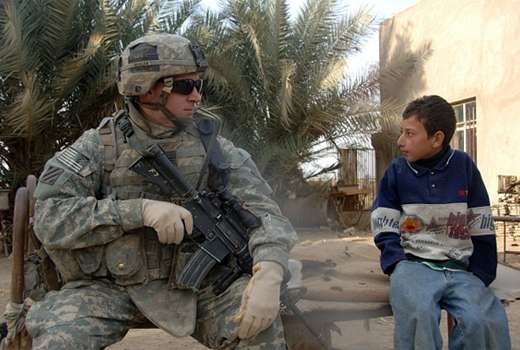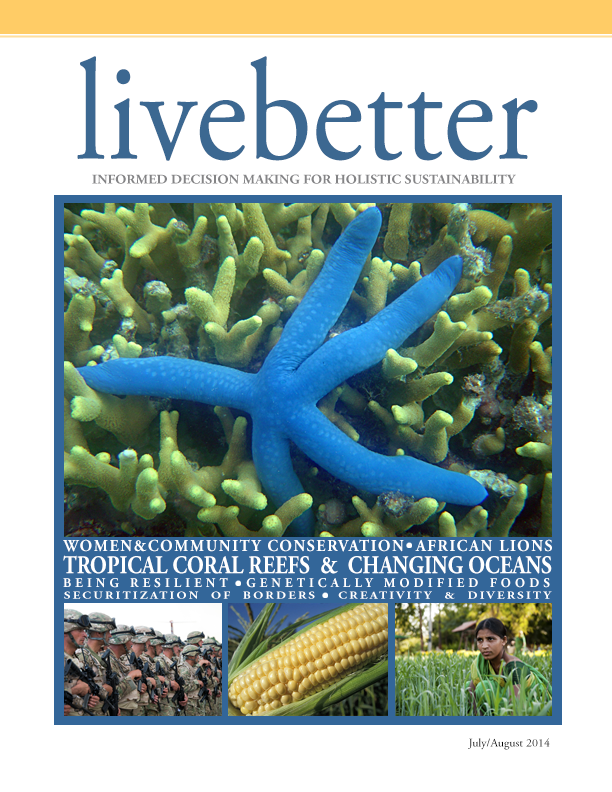The Critical Need to Increase U.S. Foreign Language Capabilities
With international demands for U.S. assistance with diplomatic intervention, humanitarian operations and disaster relief efforts, a burning call exists for bilingual personalities in every field of study or practice to lend their special skills. From medical teams aiding the distressed to the spreading threat of civil wars to peacekeepers reinforcing security, stakeholders are reminded that the linguistic requirements of tomorrow will outgrow the capabilities of training and sustainment platforms today. Therefore, a stronger call for intense language and cultural training should be a priority for academic institutions.
Reflecting on my days as a young U.S. Army Special Forces (SF) Soldier assigned to the 5th Special Forces Group in 1990, I learned early in my career the significance of having operational language skills. Although initially trained in writing, reading, listening and speaking, the two skill sets that gave a Special Forces operator the edge were speaking and listening. Just like many demanding occupations, all essential training was rigorous and important; however, I put language at the top. This is uniquely true with the ability to learn and to sustain proficiency with the more difficult languages, such as Arabic, Chinese, Japanese and Korean. As with other specialized organizations, the Special Forces community places much value in language skills and in understanding its demonstrated value.
I have found that the Special Forces leadership continues to recognize this perishable skill as a vital link to mission success as demonstrated by Key Leader Engagements in Iraq, Afghanistan and other places where major operations are underway. Foreign language training is introduced as an imperative during the SF orientation and in the initial phases of training. Language is a core competency of Special Forces, and from its inception, being bilingual was a strong point of a seasoned Special Forces Soldier. During day-to-day training and while engaging in mission related exercises, it continues to be common practice to see an Operational Detachment Alfa (ODA) during tasks using his assigned language.
In the late summer of 1991, on a humid morning after completing physical fitness training with my ODA, I asked the Company Sergeant Major (SGM) what it took to be a great Special Forces Soldier. He looked at me with a slight smile, squinted his eyes from the sweat, and said, “Young Sergeant, every guy can run two-miles in 11 minutes, and many can shoot with their eyes closed if they practice long enough. However, how many can travel to a country in our Area of Operation and train with the natives using their trained language skills?” I quickly responded “Yes Sergeant Major,” as something struck me, and then I headed inside the building holding that thought.
That brief conversation never left my mind, and from that day forward, I took his words to heart. The need for operational linguistic skills proved true during the first Gulf War as noted by many Commanders across the U.S. Army. For the 5th SF Group, ODAs were prepared to take the point because the Middle East was part of our Area of Operation. There, ODAs were assigned to Arab units as
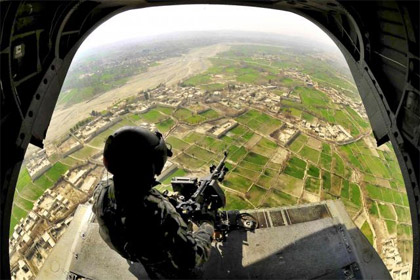
Photo Credit: U.S. Army|trainers and advisors. We worked, ate and lived side-by-side with our counterparts.
The skill that was most instrumental in accomplishing our mission was the ability to speak the language and to understand the culture. Being culturally attuned and possessing immeasurable regional experience allowed the teams to gain immediate rapport and facilitated cultural interactions. The veterans of the region mentored our less-experienced SF team members. It was common to see a SF Detachment of 12 men assigned to an Arab military Battalion of 500 men. It was common to see SF Soldiers leading the training – in Arabic. Today, this capability is being reinforced within the ranks.
What further propelled my drive to learn the language and to encourage others to see its value was when I witnessed a conversation with an attached Military Intelligence (MI) linguist and my Team Sergeant during a train-up before a deployment. The Team Sergeant was testing the MI linguist’s ability to think fast on his feet in the language by asking him during the initial welcoming to the team, “How do I say, ‘Back up the truck’ in Arabic?” The MI linguist paused while formulating a proper way to answer the question but was not able to respond readily. The Team Sergeant said, “I don’t need you on my team. You can take your bags out of my team room.”
It was both shocking and a dose of reality because the MI linguist was school-trained and tested at a Level 2/2 in Arabic. This meant he was at the intermediate level as measured by the Defense Language Proficiency Test (but in reading and listening, not speaking) in accordance with the proficiency scale of the International Language Roundtable (ILR). However, I was not sure if he maintained his language skills with regular scheduled training, but it was a well-noted lesson.
Now, more than ever, I grew more determined to possess an advanced level of speaking and listening. I spoke every chance I got, even reading signs aloud and banners in Arabic. I promised myself that I would never be caught off guard. I visited our language training facility on a weekly basis, if only for an hour, unless I was away in some other training. I wanted to practice because I saw proof that unless there is active engagement on a regular schedule, the ability to orally communicate will be the first skill set to depreciate. As I grew in rank, I maintained the sense of responsibility as part of the ODA leadership to never be in a situation where I would have to ask someone how to say something at the elementary level in my trained language (that happened to be Arabic). That was my fuel to put in the extra hours required to grow in this capability.
Eventually, I was afforded the opportunity to serve as Director of the 5th SF Group Command Language Training Program for a five-year period. As chief administrator, I reiterated this philosophy into the minds of ODA Team Leaders. I was determined to build a program that fit the unit need and that the leadership as well as the soldiers would embrace. However, I quickly realized that several instrumental aspects of program management and administration must be in place to run a quality-based foreign language center. I researched several schools with established programs. I traveled to see what they were doing right.
Much knowledge as well as best practices were shared, and this formed the foundation of my visionary leadership and management focus as Language Program Director. Each principal or director must be a visionary if this area will produce supreme results. Of the key areas, let us look at five critical ones: They include staff and instructors, curriculum, facility and resources, student goals and higher levels of support.
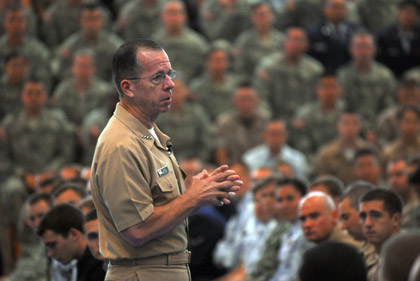
Photo by Petty Officer 2nd Class Steven Shepard |Former Chairman of the Joint Chiefs of Staff, Adm. Mike Mullen, speaks to approximately 2,000 Defense Language Institute/Foreign Language Center staff and students.
Staff and Instructors. This is a decisive and sometimes problem area to address and to correct because people are involved and feelings sometimes interfere with decision-making. Experience has shown me that each person must be qualified to meet the needs of the institution as defined by the scope of work and the mission. If the mission changes then a modification or retraining should take place with the existing staff and some of the instructors’ positions may change. If emerging technologies are introduced, then proper training must take place and take place often. Professional development must enhance the job position and not be a check-the-block type of system. Evaluations must be tied into student achievement.
Hiring and retaining the right people for the right job is often the Human Resource and leader challenge. Few understand that in order to excel in the foreign language business, you must be properly staffed with “qualified and devoted” people, who are “passionate about teaching,” and not just those desiring a job or filling the position because of their impressive resume. Cultural interpretations are equally important in employing qualified and devoted people, who are passionate about teaching to grow our capability. As an administrator, you must know that it is easy to fill a classroom, but once the doors close, it is up to your instructors to retain the students.
Curriculum. Not only must curriculum match the academic needs of the institution or agency, it must tie into the operational need. Additionally, the material must be packaged in a way that is relevant, updated and of interest to the audience. I have looked at many language-training curriculums, and the subject material is perfect. However, the relevance of the subject content for students can be much better. For example, a group of soldiers is studying for their annual examination (Reading and Listening). Today’s subject is centered on a medical situation, and the focal point of the discussion is about a scientist in London discovering a new cell that links our brain to stimulate growth in our hair and nails.
Boring for many Soldiers and perhaps boring for many students! A better subject would be to talk about illnesses and injuries of our Wounded Warriors or things of deep concern to a Soldier. Why not discuss the medical posture within the community? Leaders, directors and administrators must make the time to relook at the curriculum and to ensure a developed plan is in place to enhance the subject material. The real test must tie into the student’s ability to accomplish day-to-day tasks using oral language skills, not simply to pass a reading and/or listening exam. So the curriculum as well as the test must support the operational goals.
Facility and Resources. In a time of fiscal constraints, many administrators have to realign departments or reduce services. However, we must be mindful that just as it took decades to build, it will take decades to rebuild if a loss if accepted in this area. When considering cuts, modernization and merging, careful consideration should be weighed. Unlike some subjects where lectures and independent study are the approach, language must involve speaking through active interaction.
Therefore, class size, instructor-to-student ratio and contact hours are important. For example, if I have Arabic classes in session, I want an instructor-to-student ratio of no more than 1:8, and I want between five to six classroom hours per day of instructor-to-student contact. This facilitates speaking, and with fewer students less time is required to reach the desired results. By no way is it easier, but it is effective! Administrators should consider some form of tele-training but with a live instructor.
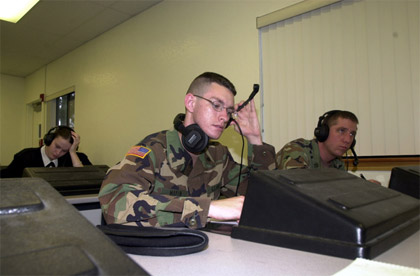
Photo by Petty Officer 2nd Class Grant Probst, USN | Army Spc. John Martin practices up on his Arabic skills at a Defense Language Institute language lab.
It all boils down to having key enabling investments to enhance effective and successful learning.
Student Goals. Understanding student goals reinforces classroom instructions and approach to training. If the student is training for a speaking and listening examination, then that is taken into consideration and more speaking by the student must take place. The student should do at least 70 percent of the speaking, and it must be in the target language. The more the student is speaking – without constant instructor interruption (for corrections) – the more student confidence will grow. Again, understanding the student goal influences the instructor’s goal, and this is the take-away. As an administrator, this must be reinforced because it is easy for an instructor to talk, but that is not effective teaching, if the student is to test in speaking.
Higher Levels of Support. Often, administrators are overwhelmed by the events of the day, scheduled meetings and mandatory briefings. So when is there time to “market the program?” Why do I need to sell the program? Well, there must be time, and you must recognize the need. With the way world events shift and with the changing of demographics in every state and district, administrators must understand the need to have continuous quality improvements and be able to sell this at every level above their office. Through effective program marketing, student interest will increase, instructor and staff passion will be refueled and interest will become evident through your enrolled as well as testing numbers. With the advancement of technology, this can be done most effectively through social media forums. Marketing awareness must be done, if we are to answer the call.
Today, as we become more diverse in all career fields within the military and civilian sectors, having speaking and listening linguistic skills are growing more important. Cross-cultural training is on the rise as well because cultural understanding promotes acceptance and tolerance. Cultural programs are included in many schools, but training on a regular basis must be instituted in order to reach supreme results. Providing quality education is one area where we as a country can no longer accept risk.

